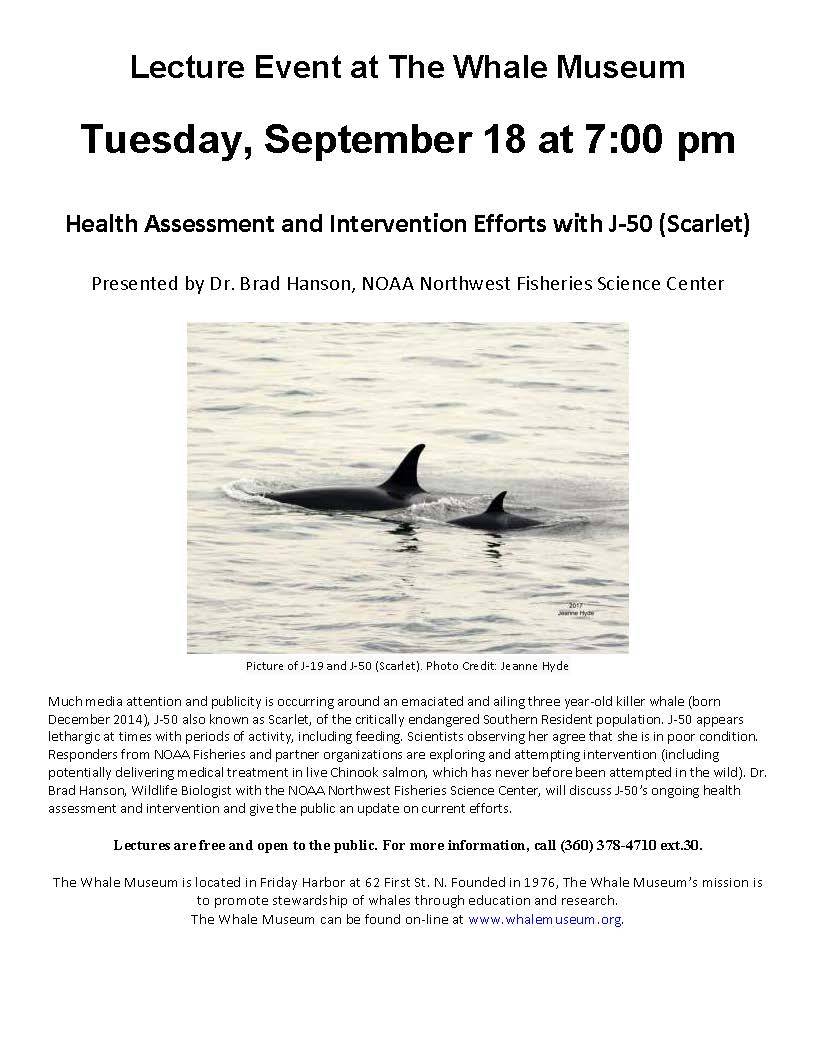Submitted by The Whale Museum
Check out two upcoming lectures about orcas at The Whale Museum.
On Sept. 18, Brad Hanson, a wildlife biologist with the National Oceanic and Atmospheric Administration Northwest Fisheries Science Center, will discuss “Health Assessment and Intervention Efforts with J50 (Scarlet).” This lecture will be held at 7 p.m., Tuesday, Sept. 18, at The Whale Museum as part of the museum’s summer lecture series.
Much media attention and publicity is occurring around an emaciated and ailing 3-year-old killer whale, J50, also known as Scarlet, of the critically endangered Southern resident population. J50 appears lethargic at times with periods of activity, including feeding. Scientists observing her agree that she is in poor condition. Responders from NOAA Fisheries and partner organizations are exploring and attempting intervention, including potentially delivering medical treatment in live Chinook salmon, which has never before been attempted in the wild. Brad Hanson, Ph.D., will discuss J50’s ongoing health assessment and intervention and give the public an update on current efforts.
On Sept. 25, John Durban from NOAA and Holly Fearnbach, Ph.D., from SR3 SeaLife Response, Rehabilitation and Research will present on “Photogrammetry Study of the Southern resident killer whales.” Photogrammetry is the use of photography in surveying and mapping to measure distances between objects.
The lecture will take place at 7 p.m. at The Whale Museum. Durban leads the Cetacean Health and Life History program at NOAA’s Southwest Fisheries Science Center in La Jolla, California. Fearnbach is the marine mammal research director for SR3, a non-profit organization in the Pacific Northwest dedicated to improving marine wildlife health and welfare. In partnership, Durban and Fearnbach have pioneered methods for studying the health of free-ranging whales and dolphins, including the use of aerial photographs to monitor the growth and body condition on Southern resident killer whales over the past decade. In this talk, Durbin will outline several ongoing research projects and methods used by his program, particularly the use of drones to noninvasively assess whale health. Additionally, Fearnbach will give an update on drone-based photography to infer the nutritional status of both Southern and Northern resident killer whales, in collaboration with the Vancouver Aquarium’s Coastal Ocean Research Institute.
The summer lecture series is dedicated to providing the local community and visiting public with knowledge and wonder of the natural world. The lectures are given by local or visiting experts in their field. Join as they share their recent research projects, stories and experiences. Each lecture is free and held at The Whale Museum. Donations are greatly appreciated. For more information, call 360-378-4710 ext.30. The Whale Museum is located in Friday Harbor at 62 First St. N. Founded in 1976, The Whale Museum’s mission is to promote stewardship of whales through education and research. Visit www.whalemuseum.org for more information.




